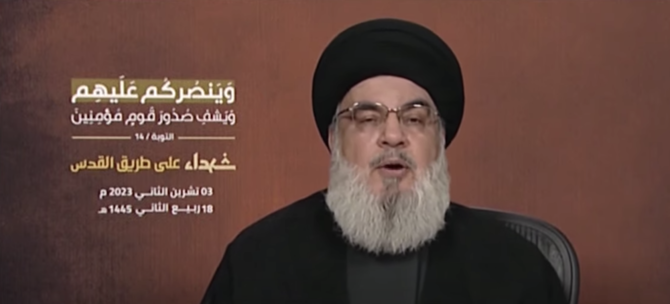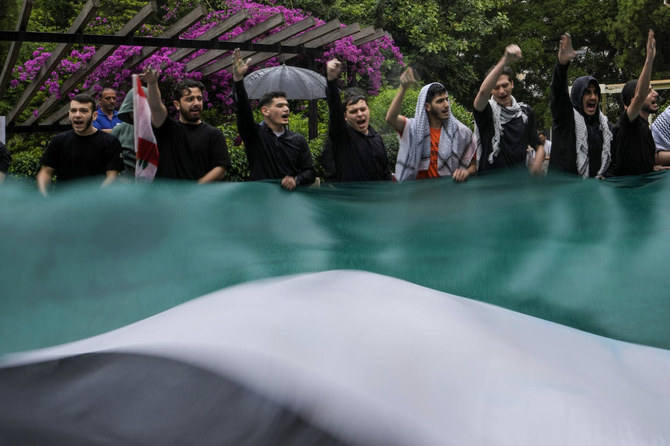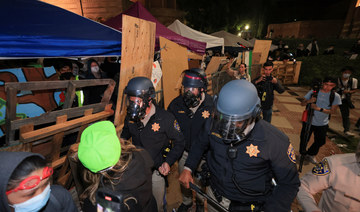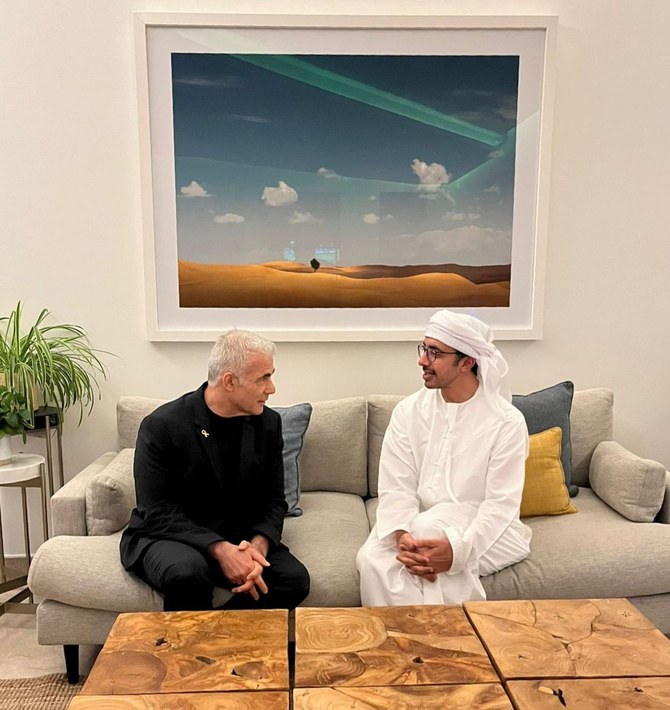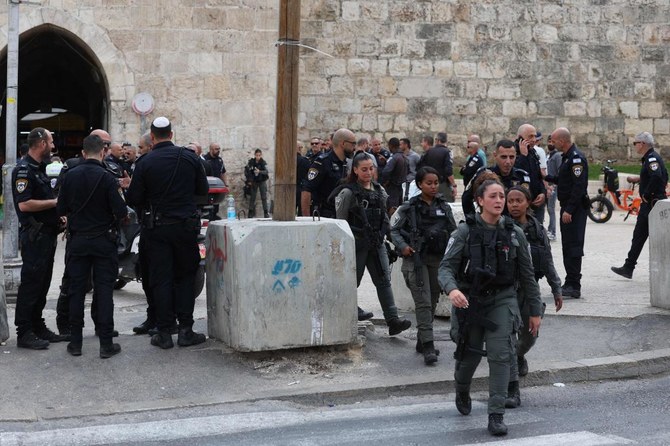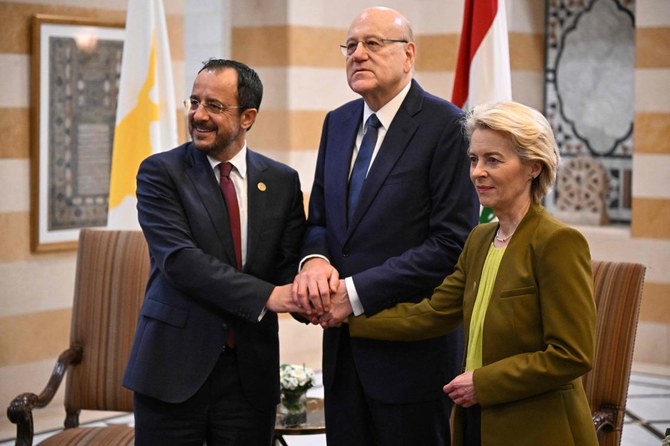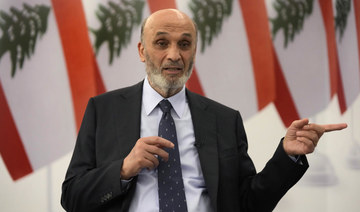BEIRUT: The only way to prevent a wider regional conflict is to halt Israel’s war on Gaza, the leader of the Hezbollah militia in Lebanon warned on Friday.
In his first remarks since the Hamas attack on Israel on Oct. 7, Hassan Nasrallah said that his powerful militia is already engaged in unprecedent cross-border fighting with Israel along the Lebanon-Israel border and threatened a further escalation as the four-week-long Israel-Hamas war rages on.
Nasrallah also said that Hezbollah, an ally of Gaza’s militant Hamas rulers, is not deterred by US warnings to stay out of the latest war. Referring to US military deployment in the region, he said American warships in the Mediterranean Sea “will not scare us.”
Hezbollah is prepared for all options, Nasrallah warned, “and we can resort to them at any time.” The fighting on the Lebanon-Israel border would “not be limited” to the scale seen until now, he added.
“You, the Americans, can stop the aggression against Gaza because it is your aggression. Whoever wants to prevent a regional war, and I am talking to the Americans, must quickly halt the aggression on Gaza,” he said.
The Pentagon has deployed two aircraft carriers to the eastern Mediterranean since the war began, and says that they are meant as a deterrent to ensure the conflict does not expand.
Nasrallah said that Hezbollah was not afraid of the warships. “We have prepared well for your fleets, with which you are threatening us,” he said.
“You, the Americans, know very well that if war breaks out in the region, your fleets will be of no use. The one who will pay the price will be ... your interests, your soldiers and your fleets.”
His speech had been widely anticipated throughout the region as a sign of whether the Israel-Hamas conflict would spiral into a regional war, following weeks of limited exchanges between the Lebanese militant group and Israeli forces on the Lebanon-Israel border.
“Some say I’m going to announce that we have entered the battle,” Nasrallah said Friday. “We already entered the battle on Oct. 8.” He argued that Hezbollah’s cross-border strikes have pulled away Israeli forces that would otherwise be focused on Hamas in Gaza.
Celebratory gunshots rang out over Beirut as thousands packed into a square in the southern suburbs of the Lebanese capital to watch the speech broadcast via video-link on a massive screen.
Nasrallah’s address to supporters came a day after the most significant escalation in clashes between Hezbollah and Israeli forces on the Israel-Lebanon border since the war started — and on the same day as a visit to Israel by the top US diplomat.
US Secretary of State Antony Blinken met with Israeli Prime Minister Benjamin Netanyahu to urge protections for civilians in the fighting with Hamas, as Israeli troops tightened their encirclement of Gaza City.
Nasrallah praised the Hamas’ unprecedented incursion into Israel in which the militants attacked farming villages, towns and military posts, killing more than 1,400 people in Israel.
“This great, large-scale operation was purely the result of Palestinian planning and implementation,” Nasrallah said, suggesting Hezbollah had no part in the attack. “The great secrecy made this operation greatly successful.”
He also said that Oct. 7 had come as “proof that Israel is weaker than a spider’s web” and that one month into the war, it allegedly “has not been able to make any achievement.”
Nasrallah also criticized the strong US backing of Israel in its bombardment of Gaza that has killed more than 9,000 people, mostly civilians. While US officials in recent days have pushed more publicly for protecting civilians in Gaza, they have yet to call for a cease-fire.
The Hezbollah leader said President Joe Biden had made a “fake argument that Hamas cut off children’s heads (without) evidence, but stayed silent for the thousands of children in Gaza who were decapitated and their limbs were torn apart” by Israeli bombing.
Hamas leaders have been pushing — sometimes publicly — for Hezbollah to widen its involvement in the Mideast war. Nasrallah met last week in Beirut with senior Hamas official Saleh Al-Arouri and with Ziad Nakhaleh of the allied group Islamic Jihad.
However, Hezbollah officials have avoided publicly setting a specific red line, saying vaguely that they would join the war if they see that Hamas is on the verge of defeat. So far, Hezbollah has taken calculated steps to keep Israel’s military busy on its border with Lebanon, but not to the extent of igniting an all-out war.
The Israeli military said seven of their soldiers and one civilian had been killed on the northern border as of Friday. More than 50 Hezbollah fighters and 10 militants with allied groups, as well as 10 civilians, including a Reuters journalist, have been killed on the Lebanese side of the border.
Israel considers the Iran-backed Lebanese Shiite militant group its most serious immediate threat, estimating that Hezbollah has around 150,000 rockets and missiles aimed at Israel, as well as drones and surface-to-air and surface-to-sea missiles.
But a full-on conflict would also be costly for Hezbollah, which fought a 34-day war with Israel in 2006 that ended with a draw — but not before Israeli bombing reduced swaths of southern Lebanon, the eastern Bekaa Valley and Beirut’s southern suburbs to rubble.
A new all-out war would also displace hundreds of thousands of Hezbollah’s supporters and cause wide damage at a time when Lebanon is in the throes of a historic four-year economic meltdown.
(With AP)



